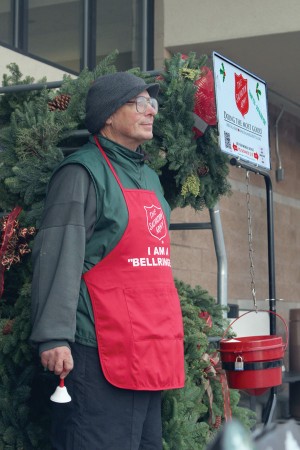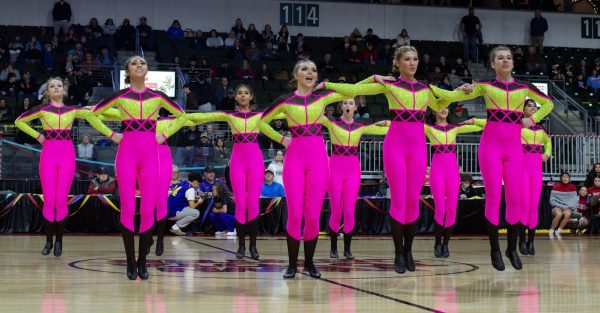Reasoning before ringing: An inside look at running Salvation Army’s red kettle
Christmas carols, cheerful greetings, the buzz of shoppers… a slew of signature sounds mark the holiday season. One of the most iconic may be the ring-ding of the Salvation Army bell across the valley’s storefronts. So accustomed to the sight, passersby may drop a few cents without second thought, but powering the red kettle takes more than just ringing a bell.

Salvation Army Bell Ringer John Hill works a shift in front of Wenatchee’s Safeway on Dec. 9.
“Each day is a battle, and the whole season is a war,” Wenatchee Corps Officer Captain Frank Desplancke said.
The season runs from the Friday before Thanksgiving to Christmas Eve, and the war is striking the right balance of working volunteers and employees at different locations to earn proceeds for those that need it most. Desplancke said funds go towards the Salvation Army’s ongoing ministries and providing assistance for rent, clothing, utilities, meals, and free showers.
“There’s three things the kettles do for the Salvation Army, especially here in Wenatchee. Number one is the money that comes in the kettle, that’s income, we praise God for that,” he said. “Number two is we do a significant amount of mail appeal… and by having people at the red kettle we gain exposure… The third thing is we hire people, we pay them to stand at the kettle, and that is a job that would otherwise not be available here in Wenatchee.”
Employees are screened and hired through Express Professionals in order to provide more individual for more locations.
“The gamut of people who work there, some are nearly homeless or living in a shelter,” Desplancke said. “Some are more well-to-do and are ringing a bell two days between jobs.”
This year, the the Salvation Army has around 18 to 19 employees. Combined with volunteers who don’t get paid, the organization is able to run around 10 to 11 kettles on weekdays and 18 to 19 on Saturdays. Deciding which locations to run and whether to run them with employees or volunteers challenges Desplancke on a daily basis.
“I am looking back at my data from two years trying to see which locations will actually earn me money, and if I can make a reasonable amount of money from the work a kettle ringer has to do, then I’ll run it,” he said. “It is complex and you have to deal with realities people are facing. Some people have their own transportation and can drive to their kettle location, others can’t. Some people have physical limitations and others don’t. You need to mix the compassion, the requirement that we make money, and doing well for the entire season all the time. So there are a bunch of judgement calls I have to make, and the nice thing is this is my third season doing it here in Wenatchee so I can make more right decisions than wrong.”
The first year he served in Wenatchee, Desplancke said that he tried to employ as many as he could, and though a fair amount was raised, the expense for paying wages was “unusually high.” Last year, he worked less people at only profitable times, and this year with a moderate approach, Desplancke said he aims to employ as many as he “reasonably can while keeping percentages in line.”
Whether for employee or volunteer, working a kettle isn’t an easy task either. In spite of bone-chilling temperatures, workers must remain cheerful while developing personal connections through greetings and small talk.
For employee Pat Forney, it was this interaction with people that made her apply for the job about seven years ago.
“I like to do it because I see people I haven’t seen in years. I see some of the kids I have coached… the first time you see them they are this tall… the next time this tall, some of them have families. It’s like jeez, I just saw you last Christmas and you just grew up,” Forney said.
Typically working eight hour days, she said the hardest part of the job is standing in one place. Yet, usually before her shift, Forney walks the various store she is at in order to get a better idea of its layout to help customers coming in.
Members of the Wenatchee Valley Lions are well acquainted with their location, as JCPenney is typically where the club volunteers every year. Members Diane Whitbeck and Gretchen Starr said two members man the kettle at a time for one hour shifts.
“We have fun. We visit and greet people and hold the door for them, so it’s a fun social time as well,” Whitbeck said. “It is for such a wonderful cause to help the needy in our valley.”
Employee or volunteer, member of Apple Valley Kiwanis or K-Kids at Sunnyslope Elementary School, the reason behind the ringing is the same.
“Salvation Army is the best at helping folks around the valley,” Forney said. “Anytime I can help them, I do.”








